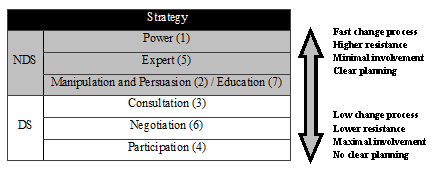According to Harzing and Hofstede four different approaches can be distinguished. The first is power. Here the change initiator decides alone and forces subjects affected by the change to accept it. The second strategy is manipulation/persuasion where the change initiator will also decide alone but makes no use of power to convince the change subjects. Therefore, he or she will try to dispute with them in order to get the recognition of the change. Consultation is the third strategy. In comparison to the first two strategies the change subjects are part of the decision making process having the right to say their opinion and formulate suggestions. In addition, they receive information to understand why the change is necessary. Nevertheless, the final decision about the change will be made by the change initiator who is not forced to follow their views and proposals. The last strategy participation involves the complete integration of the change subjects who plan the change process whereas the initiator has to follow their will. This strategy is aiming on an agreement accepted by all. In a second form of this approach the change agent gathers the opinions of the change subjects and tries to combine them into one.[1]
Further, three other strategies can be defined. In the expert strategy the instructor decides alone and enforces the change but uses outside experts as support and in the negotiating strategy the agent negotiates with the affected subjects to cause change. The seventh strategy education means trying to change the values and beliefs of the change subjects to get fully support.[2]
In the style of Harzing and Hofstede[3] the methods one, two, five and seven can be united in the group of non-democratic strategies (NDS) and the approaches three, four and six as democratic strategies (DS) what can be retraced in figure two. The first group represent change strategies where the change subjects are not or only less involved in the change process. In the opposite the second group contains strategies where the change subject has a higher involvement in the planning and realisation of the change.
The selection of the change strategies is crucial because this influences the tempo and the planning of the change process as well as the resistance in it. Normally, the strategies dealing with force have a higher tempo, exact planning and higher resistance. Strategies with more involvement of the change subjects show the opposite direction. The strategies two and seven have a slower tempo, exact planning and less resistance.[4]
Figure 1 summarizes these connections.
Figure 1: Overview of change strategies and their characteristics

Source: Adapted from JISC InfoNet (2004).
[1] See Harzing/Hofstede (1996), pp. 321-322.
[2] See JISC InfoNet (2004).
[3] See Harzing/Hofstede (1996), p. 322.
[4] See JISC InfoNet (2004).
References
Harzing, A.-W./Hofstede, G. (1996), Planned change in organizations: The influence of national culture, in: Research in the sociology of organizaton: a research annual 14, 297-340.
JISC InfoNet. (2004), Change Strategy and Approaches, http://www.jiscinfonet.ac.
uk/infokits/change-management/change-strategy-and-approaches, 06.11.2009.
k&k Consulting, Existenzgründerberatung, Existenzsicherung, Unternehmensberatung, Magdeburg
tags: international management, organizational behaviour, change strategies





